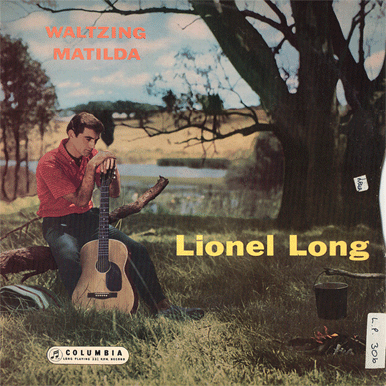|
The ability to express oneself musically
or artistically can usually be traced to some inheritance, and the
natural talent of Lionel Long has such a background. His father was a
notable violinist, popular and highly experienced, and Lionel, even
without any organised teaching, expressed an obvious musical talent as a
very young man. Still in his early twenties, he -bas made a definite and
important name as a folk singer and balladist.
He taught himself to play the guitar and would entertain his workmates
and friends with songs of his own composition around the camp fire in
the evenings. There is an outdoor robustness about his interpretation of
our own Australian folk songs and ballads that is effectively
demonstrated on this recording. He approaches his work with a quiet
dignity, giving due regard to the mood of the music and the intention of
tile various composers. Although this particular album does' not
entirely feature folk songs, it is designed to display the ability of
the artist to interpret songs of greatly varying character in addition
to making more widely known some of the songs typical of this country.
It takes more than just a voice to capture the imagination of 'the
public, especially of variable ages, but it quickly became evident that
Lionel has an unmistakably captivating approach, and an unusual
completeness in his work, that interests both young and old. The quality
of being able to stir the imagination of audiences is vested in .the
depth of sincerity expressed by the artist. In this respect Lionel Long
has a depth of true sincerity, the ability to create varying emotions,
joy or sadness, inspiration or elation, by the inflection of the voice
and the consciousness of a personality.
As a very young man he worked in the outback country on sheep and cattle
stations and by experience learned the necessity and importance of being
neighbourly, the value of creating friendship and goodwill, and the
satisfaction of tilling the soil and studying nature at its very best.
The drama of combating the seasonal elements, the joy of seeing the
results of man's work from Mother Earth, fired his imagination to watch
the beauty of a sunrise, to inhale the perfume of wattle trees in bloom,
the sight of the misty blue of the mountains together with the
everchanging patterns that nature ' weaves with the changing seasons.
This firmly installed in his mind a desire to be able to sing the songs
and ballads descriptive of his land.
His rise to prominence was indeed rapid; recordings, radio, films and
television claimed most of his time, but he always found time to
continue his many sporting activities, which include sailing, football,
athletics, swimming and incidentally he is a very competent commercial
artist, with distinct ability in the art of painting. Music, which
originally was his hobby, is now his profession, and his hobby now is
photography. Thus a career was created and it would seem a long step
from being a student at Hawkesbury Agricultural College to become
acclaimed by the press as "Australia's Top Folk Singer.
|

|
GLOSSARY OF {AUSTRALIAN SLANG TERMS}
BOARD: Section of the shearing shed used specifically for the shearing
of wool from the sheep. In the early days constructed from rough wooden
planks or boards.
BILLABONG: An expanse of water which was once portion of a lake or
river. Often called a lagoon, or an "oxbow''.
BLUEY: A roll of blankets and belongings carried by a swagman or shearer
while travelling. Also called a swag.
BUNYIP:A mythical creature of Aboriginal legend sometimes regarded as
ferocious while other sources say it's harmless. Said to inhabit
billabongs and rivers.
BLOW: A shearing term describing a cutting stroke made with the shears
when shearing the wool from a sheep.
CLEANSKINS: Unbranded cattle.
JACKAROO: Apprentice manager of a property running cattle or sheep.
JACK SHEA: A tin container or utensil. Used for boiling water or
cooking. Also called a "billy can".
JACKASS: Nickname given to the Kookaburra, a native Australian bird.
JUMBUCK: A sheep.
FLUKE: A disease in the liver of sheep.
PUB: A hotel.
PEELERS: Nickname given to policemen. Derives from the name of Sir
Robert Peel.
RINGER: Sometimes the best shearer in a shearing shed or in some areas a
cattle drover.
SWAGMAN: A hobo; often called a sundowner.
SWAG: Same as "bluey".
SOVEREIGN: A coin worth one pound.
SHEARER: Man employed to shear sheep.
TAR BOY: Boy employed in shearing shed to gather the shorn wool who also
tends cuts or injuries, made by shearers, by dabbing on tar to stop
bleeding. This method is now obsolete.
TIN: Slang used in colonial days for money.
TUCKERBAG: Bag used for carrying tucker (food).
TROOPERS: Mounted policemen.
WALLABY: Smaller type of Kangaroo.
RUM CULL: Drinking mate.
YO: Ewe - a female sheep.
COLUMBIA LONG-PLAYING 331 R.P.M. RECORD Copyright Record — All Rights
Reserved
MADE AND DISTRIBUTED IN AUSTRALIA BY E.M.I. (AUSTRALIA) LIMITED, SYDNEY,
NEW SOUTH WALES
Manufacturers of World-Famous "His Master's Voice" Record Players, Radio
and Television Receivers
MONO 330SX 7641 - STEREO SCXO 7506 |




